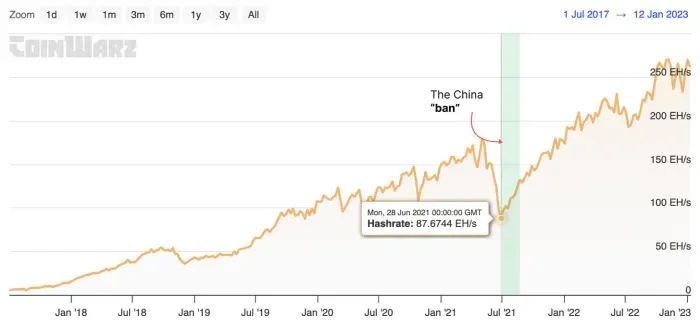Analyzing the claim that Bitcoin mining was banned in China in 2021
But in China, most mining activity is now happening in Inner Mongolia, far from the large developed cities. In these regions what matters culturally is not the government regulations but your connections
An extraordinary reveal: Mining was never banned in China.
Yes, you read that right. In fact, not only was it not banned, but Chinese miners are leading the world in innovative uses of Bitcoin mining.
But what of this Reuters report and others that says it was banned?
Let’s have a closer look.
Yes, network hashrate dropped from 179.2 EH/s to 87.7 EH/s (a 51.1% drop) seemingly confirming that China banned mining.
After all, China was according to Cambridge 46% of global hashrate the month prior to the “ban” (April 2021). So the figures roughly tally up with the thesis that “mining has been banned in China.”
But there’s a big gap in this logic. If you are a disruptive student, and the principal sends you away from school, those “days absent from school” don’t mean you’ve been expelled. It could mean you’ve merely been suspended. Turns out that’s exactly what happened in China.
Here’s how we know.
- Investigative reporting
Let’s start with the mainstream news reports.
First, NBC reported in May 2021 that at least some miners were “unfazed” by the latest “ban”.
The New York Times then reported a “ban” in China in September 2021, citing this policy disclosure from the Chinese Government (more on that later), even though that same month, publicly available data from Cambridge showed that mining activity had already bounced back to 22.3% of global hashrate.
Cambridge data showed that by Dec 2021 China was still at 19.1% of global hashrate.
It wasn’t until May 2022 that CNBC ran a full report on the significant Bitcoin mining hashrate still operating within China, even though this data had been publicly available to all media outlets since September 2021.
Apart from the New York Times piece, the evidence points to mining never being banned, merely suspended. Let’s look more closely then at the New York Times article and the document they cite as evidence for a ban.
2. Our surprising find in Chinese legislation
When I read the document the New York Times used as evidence for a ban, it did not support their interpretation.
The Chinese policy document of 24 September 2021 does not legislate a ban, but rather a moratorium on the establishment of any new mining sites, plus a "signal of intent" (but not a ban) to "at some stage" grandfather existing mining activity (which three years later has still not occurred).
Regarding the statement of intention: the policy says that bitcoin mining sites are something that should be gradually eliminated, because it does not support the Chinese Government’s carbon neutral goals. Other reasons stated are that it is easy to use for money laundering and a high user of electricity.
Cultural factors not taken into account by the New York Times
In China, it is common that policy says one thing, but what is implemented is very different
As a general rule, in the more developed cities, the letter of the law will be carried out literally. However, in smaller cities and regions, this is seldom the case.
For example, officially in China there is a policy where all banks must by law reduce the steps their customers go through to get any legal certified documents.
However, in most cities, private banks don't follow the regulation, the opposite is practised. For example, if a parent or spouse dies and you need to get the leftover amount in their bank account, the bank can say "your death certificate is not enough". There have been cases of the bereaved needing to bring the dead body to the bank to prove it. I kid you not.
More developed cities will follow the letter of the law. But in China, most mining activity is now happening in Inner Mongolia, far from the large developed cities. In these regions what matters culturally is not the government regulations but your network. If you have the right network you can do "this and that" to go around the legislation.
So in summary:
- Mining was never banned, rather there was a moratorium on new mining and unfriendly overtures about grandfathering existing mining facilities at some point.
- Fossil fuel use was the stated primary reason (though we know from inside sources within the Communist party that while this was definitely a factor, capital control was the primary reason). Energy policy expert Magdalena Gronowska has cross-validated this.
- Apart from coal-based mining, the moratorium was never implemented in the more secluded regions. There, new mining activity has come online.
- The New York Times did not accurately portray the Chinese policy document, lacked an appreciation of cultural factors that rendered even the moratorium something that may not be widely enforced, and failed to cross-check publicly available hashrate records which would have told them that mining activity was still occurring on a large scale in China.






